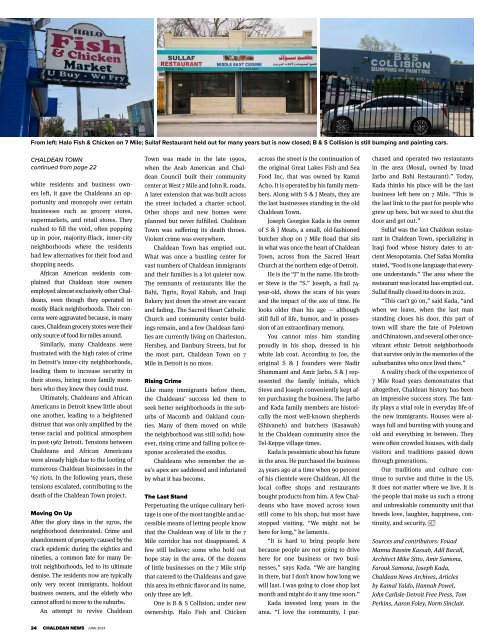Create successful ePaper yourself
Turn your PDF publications into a flip-book with our unique Google optimized e-Paper software.
From left: Halo Fish & Chicken on 7 Mile; Sullaf Restaurant held out for many years but is now closed; B & S Collision is still bumping and painting cars.<br />
CHALDEAN TOWN<br />
continued from page 22<br />
white residents and business owners<br />
left, it gave the Chaldeans an opportunity<br />
and monopoly over certain<br />
businesses such as grocery stores,<br />
supermarkets, and retail stores. They<br />
rushed to fill the void, often popping<br />
up in poor, majority-Black, inner-city<br />
neighborhoods where the residents<br />
had few alternatives for their food and<br />
shopping needs.<br />
African American residents complained<br />
that Chaldean store owners<br />
employed almost exclusively other Chaldeans,<br />
even though they operated in<br />
mostly Black neighborhoods. Their concerns<br />
were aggravated because, in many<br />
cases, Chaldean grocery stores were their<br />
only source of food for miles around.<br />
Similarly, many Chaldeans were<br />
frustrated with the high rates of crime<br />
in Detroit’s inner-city neighborhoods,<br />
leading them to increase security in<br />
their stores, hiring more family members<br />
who they knew they could trust.<br />
Ultimately, Chaldeans and African<br />
Americans in Detroit knew little about<br />
one another, leading to a heightened<br />
distrust that was only amplified by the<br />
tense racial and political atmosphere<br />
in post-1967 Detroit. Tensions between<br />
Chaldeans and African Americans<br />
were already high due to the looting of<br />
numerous Chaldean businesses in the<br />
‘67 riots. In the following years, these<br />
tensions escalated, contributing to the<br />
death of the Chaldean Town project.<br />
Moving On Up<br />
After the glory days in the 1970s, the<br />
neighborhood deteriorated. Crime and<br />
abandonment of property caused by the<br />
crack epidemic during the eighties and<br />
nineties, a common fate for many Detroit<br />
neighborhoods, led to its ultimate<br />
demise. The residents now are typically<br />
only very recent immigrants, holdout<br />
business owners, and the elderly who<br />
cannot afford to move to the suburbs.<br />
An attempt to revive Chaldean<br />
Town was made in the late 1990s,<br />
when the Arab American and Chaldean<br />
Council built their community<br />
center at West 7 Mile and John R. roads.<br />
A later extension that was built across<br />
the street included a charter school.<br />
Other shops and new homes were<br />
planned but never fulfilled. Chaldean<br />
Town was suffering its death throes.<br />
Violent crime was everywhere.<br />
Chaldean Town has emptied out.<br />
What was once a bustling center for<br />
vast numbers of Chaldean immigrants<br />
and their families is a lot quieter now.<br />
The remnants of restaurants like the<br />
Bahi, Tigris, Royal Kabab, and Iraqi<br />
Bakery just down the street are vacant<br />
and fading. The Sacred Heart Catholic<br />
Church and community center buildings<br />
remain, and a few Chaldean families<br />
are currently living on Charleston,<br />
Hershey, and Danbury Streets, but for<br />
the most part, Chaldean Town on 7<br />
Mile in Detroit is no more.<br />
Rising Crime<br />
Like many immigrants before them,<br />
the Chaldeans’ success led them to<br />
seek better neighborhoods in the suburbs<br />
of Macomb and Oakland counties.<br />
Many of them moved on while<br />
the neighborhood was still solid; however,<br />
rising crime and falling police response<br />
accelerated the exodus.<br />
Chaldeans who remember the area’s<br />
apex are saddened and infuriated<br />
by what it has become.<br />
The Last Stand<br />
Perpetuating the unique culinary heritage<br />
is one of the most tangible and accessible<br />
means of letting people know<br />
that the Chaldean way of life in the 7<br />
Mile corridor has not disappeared. A<br />
few still believe; some who hold out<br />
hope stay in the area. Of the dozens<br />
of little businesses on the 7 Mile strip<br />
that catered to the Chaldeans and gave<br />
this area its ethnic flavor and its name,<br />
only three are left.<br />
One is B & S Collision, under new<br />
ownership. Halo Fish and Chicken<br />
across the street is the continuation of<br />
the original Great Lakes Fish and Sea<br />
Food Inc. that was owned by Ramzi<br />
Acho. It is operated by his family members.<br />
Along with S & J Meats, they are<br />
the last businesses standing in the old<br />
Chaldean Town.<br />
Joseph Georgies Kada is the owner<br />
of S & J Meats, a small, old-fashioned<br />
butcher shop on 7 Mile Road that sits<br />
in what was once the heart of Chaldean<br />
Town, across from the Sacred Heart<br />
Church at the northern edge of Detroit.<br />
He is the “J” in the name. His brother<br />
Steve is the “S.” Joseph, a frail 74-<br />
year-old, shows the scars of his years<br />
and the impact of the axe of time. He<br />
looks older than his age — although<br />
still full of life, humor, and in possession<br />
of an extraordinary memory.<br />
You cannot miss him standing<br />
proudly in his shop, dressed in his<br />
white lab coat. According to Joe, the<br />
original S & J founders were Nadir<br />
Shammami and Amir Jarbo. S & J represented<br />
the family initials, which<br />
Steve and Joseph conveniently kept after<br />
purchasing the business. The Jarbo<br />
and Kada family members are historically<br />
the most well-known shepherds<br />
(Shivaneh) and butchers (Kasawah)<br />
in the Chaldean community since the<br />
Tel-Keppe village times.<br />
Kada is pessimistic about his future<br />
in the area. He purchased the business<br />
24 years ago at a time when 90 percent<br />
of his clientele were Chaldean. All the<br />
local coffee shops and restaurants<br />
bought products from him. A few Chaldeans<br />
who have moved across town<br />
still come to his shop, but most have<br />
stopped visiting. “We might not be<br />
here for long,” he laments.<br />
“It is hard to bring people here<br />
because people are not going to drive<br />
here for one business or two businesses,”<br />
says Kada. “We are hanging<br />
in there, but I don’t know how long we<br />
will last. I was going to close shop last<br />
month and might do it any time soon.”<br />
Kada invested long years in the<br />
area. “I love the community, I purchased<br />
and operated two restaurants<br />
in the area (Mosul, owned by Imad<br />
Jarbo and Bahi Restaurant).” Today,<br />
Kada thinks his place will be the last<br />
business left here on 7 Mile. “This is<br />
the last link to the past for people who<br />
grew up here, but we need to shut the<br />
door and get out.”<br />
Sullaf was the last Chaldean restaurant<br />
in Chaldean Town, specializing in<br />
Iraqi food whose history dates to ancient<br />
Mesopotamia. Chef Safaa Momika<br />
stated, “Food is one language that everyone<br />
understands.” The area where the<br />
restaurant was located has emptied out.<br />
Sullaf finally closed its doors in 2022.<br />
“This can’t go on,” said Kada, “and<br />
when we leave, when the last man<br />
standing closes his door, this part of<br />
town will share the fate of Poletown<br />
and Chinatown, and several other oncevibrant<br />
ethnic Detroit neighborhoods<br />
that survive only in the memories of the<br />
suburbanites who once lived there.”<br />
A reality check of the experience of<br />
7 Mile Road years demonstrates that<br />
altogether, Chaldean history has been<br />
an impressive success story. The family<br />
plays a vital role in everyday life of<br />
the new immigrants. Houses were always<br />
full and bursting with young and<br />
old and everything in between. They<br />
were often crowded houses, with daily<br />
visitors and traditions passed down<br />
through generations.<br />
Our traditions and culture continue<br />
to survive and thrive in the US.<br />
It does not matter where we live. It is<br />
the people that make us such a strong<br />
and unbreakable community unit that<br />
breeds love, laughter, happiness, continuity,<br />
and security.<br />
Sources and contributors: Fouad<br />
Manna Bassim Kassab, Adil Bacall,<br />
Architect Mike Sitto, Amir Samona,<br />
Farouk Samona, Joseph Kada,<br />
Chaldean News Archives, Articles<br />
by Kamal Yaldo, Hannah Powel,<br />
John Carlisle-Detroit Free Press, Tom<br />
Perkins, Aaron Foley, Norm Sinclair.<br />
24 CHALDEAN NEWS <strong>JUNE</strong> <strong>2023</strong>

















